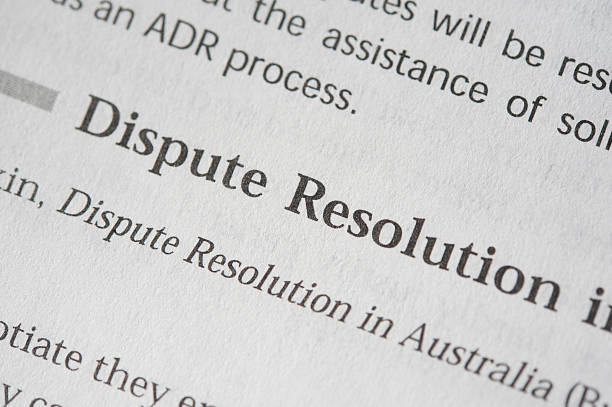What is family dispute resolution services or FDRS for short? It is a unique type of mediation that helps disputes parties to reach mutual agreements about family law disputes. Many divorced or separated parties find it hard to agree on important matters. These include property settlement and parenting disputess like child custody.
A FDRS practitioner helps the persons involved to have discussions to reach an amicable agreement by upholding best interests of the child. In fact disputed parties must make a genuine effort in FDRS before they approach the Family Court. Parties must show proof that they attended mediation before visiting visit the family law court for their family law issues.
In this article, we explore the Family Law Act’s inclusions regarding FDR in Australia. Part II Division 3 of the Act consists of various Sections that discuss various points in relation to FDRS.
Family Law Act Part II Division 3
Part II of the Family Law Act provides information on various non-court based services. Among these, family dispute resolution service (FDRS) is an extremely important non-court based service in family law.
Division 3 under Part II is all about family dispute resolution (FDR) service. In this blog, we’ll look at each Section that falls under Division 3, Part II of the Family Law Act (1975)
Section 10F: Definition of FDRS
This Section provides a definition of FDR, and it states that FDR is a process, separate from a judicial process. According to this definition, firstly, a family dispute resolution practitioner:
- Helps people to resolve their family law disputes with each other after divorce/separation
- Helps a person involved who may apply for parenting orders (under Section 65C) to resolve all of their, or some of their disputes with each other in relation to the care of the child or children.
Secondly, the family dispute resolution practitioner should be independent of all parties involved in the process or case.
Section 10G: Definition of a Family Dispute Resolution (FDR) Practitioner
This section outlines points that defines a family dispute resolution FDR practitioners for family law matters. According to this Section, an FDR practitioner is a person who is:
- accredited as a FDR practitioner under the Accreditation Rules; or
- authorised to act on behalf of an organisation designated by the Minister for the purposes of this paragraph. The Minister must publish the list of such organisations, or
- authorised under section 281 of the FCFCA to act as a FDR practitioner, or
- engaged under subsection 18ZI(2) of the Federal Court of Australia Act 1976 as a practitioner,
- authorised by a Family Court of a State to act as a FDR practitioner.

Section 10H: Confidentiality of Communication in FDR Process
This is a rather important Section as it highlights the importance of confidentiality in these processes. It states that a FDRS practitioner must not disclose communication made to them during FDR process.
There are, however, exceptions to this. For example, a practitioner can disclose communication if it is necessary for protecting a child from risk or harm. Moreover, they can disclose if it can help in lessening an imminent threat to the safety of a person etc. Furthermore, they can disclose information if such disclosure is necessary for them to comply with a law of the Commonwealth, a State or Territory.
Moreover, they can disclose communication if the person who made the communication gave their consent. This is if the person is over 18). In case the person is under 18, then the party who has parental responsibility for the child, or the court must give consent to the disclosure of communication. They can also disclose information to provide research that is relevant for the families.
Section 10J: Admissibility of Communication
Evidence of anything said by the FDR practitioner or the parties who are attending a resolution session is not admissible in any court, or any in any proceedings. However, similar to the confidentiality point mentioned above, this does not apply to any admission by an adult that indicates that a minor child has been abused, or is at risk of abuse.
Similarly, this does not apply to any admission made by a child herself/himself that indicates that they were abused, or at risk of being abused.
Section 10K: FDRS Practitioners Must Comply With Regulations
Section 10K states that practitioners must comply with regulations in relation to the FDRS they provide. It states that the regulations may prescribe penalties in respect of offences against regulations.

Seeking Legal Assistance for Family Law Disputes
It is natural to face disputes following a divorce or separation when discussing matters like child support, child custody, property settlement and spousal support. When you are in the midst of a dispute with your former spouse, you should consider attending mediation to make a genuine effort to reconcile differences.
However, for serious issues like family violence or child abuse, court intervention becomes necessary. Our lawyers can provide the best legal advice for serious issues such as family violence and child abuse.
Our family law firm JB Solicitors has a team of award-winning family law arbitrators and mediators who provide mediation and dispute resolution services to parties. These services greatly help the disputed parties to have healthy discussions in order to reach mutual agreements and make parenting plans.
We also offer fixed-fee legal costs for our family law services including divorce and family law services, family law mediation and family law arbitration. As mentioned above, Family Courts require parties to attend dispute resolution before they approach the Family Court for any family disputes.
This is why it is extremely important to attempt to resolve conflicts among yourselves through dispute resolution. This also gives more control to the parties, and they can make decisions based on their own terms. For more information on our services, or on dispute resolution, please do not hesitate to reach out and speak to our leading law firm today.
Contact us if you are wish to find legal answers.
